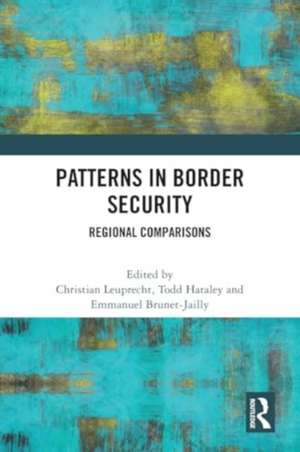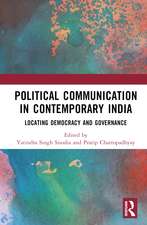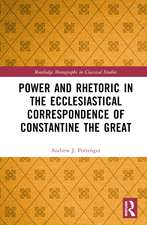Patterns in Border Security: Regional Comparisons
Editat de Christian Leuprecht, Todd Hataley, Emmanuel Brunet-Jaillyen Limba Engleză Paperback – 26 aug 2024
The Open Access chapters of this book, available at http://www.tandfebooks.com/doi/view/10.4324/9781003216926, have been made available under a Creative Commons Attribution-Non Commercial-No Derivatives 4.0 license.
| Toate formatele și edițiile | Preț | Express |
|---|---|---|
| Paperback (1) | 383.94 lei 43-57 zile | |
| Taylor & Francis – 26 aug 2024 | 383.94 lei 43-57 zile | |
| Hardback (1) | 883.65 lei 43-57 zile | |
| Taylor & Francis – 12 dec 2022 | 883.65 lei 43-57 zile |
Preț: 383.94 lei
Nou
Puncte Express: 576
Preț estimativ în valută:
73.53€ • 75.76$ • 61.60£
73.53€ • 75.76$ • 61.60£
Carte tipărită la comandă
Livrare economică 24 februarie-10 martie
Preluare comenzi: 021 569.72.76
Specificații
ISBN-13: 9781032107639
ISBN-10: 1032107634
Pagini: 208
Dimensiuni: 156 x 234 mm
Greutate: 0.39 kg
Ediția:1
Editura: Taylor & Francis
Colecția Routledge
Locul publicării:Oxford, United Kingdom
ISBN-10: 1032107634
Pagini: 208
Dimensiuni: 156 x 234 mm
Greutate: 0.39 kg
Ediția:1
Editura: Taylor & Francis
Colecția Routledge
Locul publicării:Oxford, United Kingdom
Public țintă
Academic, Postgraduate, and UndergraduateNotă biografică
Christian Leuprecht is Class of 1965 Professor in Leadership, Department of Political Science and Economics, Royal Military College of Canada; Director of the Institute of Intergovernmental Relations, School of Policy Studies, Queen’s University, Canada; Adjunct Research Professor, Australian Graduate School of Policing and Security, Charles Sturt University, Australia; and Munk Senior Fellow in Security and Defence at the Macdonald Laurier Institute. A former Fulbright Research Chair in Canada-US Relations at the School for Advanced International Studies at Johns Hopkins University in Washington, DC (2020) and a former Eisenhower Fellow at the NATO Defence College in Rome (2019), he is a recipient of RMC’s Cowan Prize for Excellence in Research and an elected member of the College of New Scholars of the Royal Society of Canada. He is Editor-in-Chief of the Canadian Military Journal.
Todd Hataley is Professor in the School of Justice and Community Development at Fleming College in Peterborough, Ontario, Canada; Adjunct Associate Professor at the Royal Military College of Canada; and a former Fulbright Research Chair in Canada-US Relations at Johns Hopkins University. He is a retired member of the Royal Canadian Mounted Police. During his tenure as a federal police officer, he conducted investigations into the smuggling of drugs, weapons and humans, money laundering, organized crime, national security, and extra-territorial torture investigations. His research focuses on managing of international boundaries, public safety, Indigenous policing, and transnational crime.
Emmanuel Brunet-Jailly is Professor in the School of Public Administration, Jean Monnet Chair and Director of the Jean Monnet Centre and the Borders in Globalization Laboratory at the University of Victoria, Canada. He is Editor of the Borders in Globalization Review.
Todd Hataley is Professor in the School of Justice and Community Development at Fleming College in Peterborough, Ontario, Canada; Adjunct Associate Professor at the Royal Military College of Canada; and a former Fulbright Research Chair in Canada-US Relations at Johns Hopkins University. He is a retired member of the Royal Canadian Mounted Police. During his tenure as a federal police officer, he conducted investigations into the smuggling of drugs, weapons and humans, money laundering, organized crime, national security, and extra-territorial torture investigations. His research focuses on managing of international boundaries, public safety, Indigenous policing, and transnational crime.
Emmanuel Brunet-Jailly is Professor in the School of Public Administration, Jean Monnet Chair and Director of the Jean Monnet Centre and the Borders in Globalization Laboratory at the University of Victoria, Canada. He is Editor of the Borders in Globalization Review.
Cuprins
Foreword Introduction - Patterns in nascent, ascendant and mature border security: regional comparisons in transgovernmental coordination, cooperation, and collaboration 1. The United States–Canada security community: a case study in mature border management 2. Security beyond the border: exploring Australia and New Zealand trans-Tasman relations in a globalised world 3. The European Union's model of Integrated Border Management: preventing transnational threats, cross-border crime and irregular migration in the context of the EU's security policies and strategies 4. Between triple borders: border security across Latin America’s Southern Cone 5. Border security management in the MENA region: models of nascent and ascendant coordination and cooperation 6. Border security in Africa: the paradigmatic case of the Sahel as the embodiment of security and economy in borderlands 7. So similar yet so distant: border security management between India and Pakistan as a laboratory of non-experimentation
Descriere
This book compares the construction of cross-border security regimes across five regions of the world to illustrate how trust emerges from the day-to-day relations of coordination, cooperation, or collaboration. It studies the way borderland communities develop, implement, and align border policy to enhance their sense of security.














